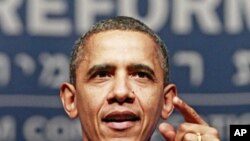In an address Friday to the largest North American Jewish organization, President Barack Obama said the United States is fully committed to Israel, and responded to recent sharp criticisms on the subject from Republican presidential candidates.
Mr. Obama traveled a short distance to a hotel just outside of Washington and the 71st General Assembly of the Union of Reform Judaism to deliver a message he has repeated frequently, that the U.S commitment to Israel's security is "unshakeable."
Formerly the Union of American Hebrew Congregations, the group calls itself the largest Jewish movement in North America, representing more than 900 congregations in the U.S, Canada and Caribbean and 1.5 million Jews.
Republican presidential candidates have criticized Mr. Obama's commitment to Israel and his broader approach to the Middle East, and strategy on Iran's nuclear program.
Mr. Obama and administration officials strongly reject this, and point to ongoing strong military-to-military and intelligence cooperation, including assistance for the Israeli "Iron Dome" missile system to guard against rocket attacks.
Mr. Obama listed these and other areas of cooperation and hit back at criticisms, saying special bonds between the U.S. and Israel should transcend partisan politics.
"It is hard to remember a time when the U.S. has given stronger support to Israel on its security," said President Obama. "In fact I am proud to say that no U.S. administration has done more in support of Israel's security than ours. None. Don't let anybody else tell you otherwise. It is a fact."
Mr. Obama's relationship with Israeli Prime Minister Benjamin Netanyahu has been tense and chilly at times, as the administration attempted to persuade Israel's government to freeze settlement activity in the occupied West Bank.
That has been a major roadblock among those preventing a return to direct negotiations between Israel and Palestinians which occurred only briefly after Mr. Obama brought Israeli and other Mideast leaders to the White House in 2010.
Mr. Obama said the only path to a just and lasting peace is through direct negotiations in pursuit of the vision of a two state solution, saying he will "not waiver" in pursuit of that vision.
He reiterated U.S. policy on Iran's nuclear program, which he called a threat to the security of Israel, the United States and the world.
"We are determined to prevent Iran from acquiring nuclear weapons, and that is why we have worked painstakingly from the moment I took office with allies and partners and we have imposed the most comprehensive, the hardest hitting sanctions that the Iranian regime has ever faced," said Obama. "We haven't just talked about it, we have done it. And we are going to keep up the pressure. And that is why rest assured we will take no options off the table."
The White House confirmed that Mr. Obama met briefly before his speech with Israel's Defense Minister Ehud Barak, who also addressed the conference.
Mr. Obama's address, in which he also reviewed major accomplishments of his presidency such as health care reform and ending the U.S. combat role in Iraq - came as he tries to prevent further erosion of support among American Jewish voters for his re-election in 2012.
Much of the speech reprised major points he has made in his struggles with opposition Republicans in Congress over jobs legislation and tax cuts to help the middle class.
Mr. Obama said the political debate in the U.S. is not just political, but a moral, ethical and values debate about whether all Americans "get a fair shake" and "play by the same rules."
Obama Responds to Republican Criticisms on Support for Israel
- By Dan Robinson





